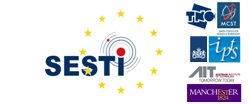SESTI Project 2009-2011
SESTI is a Collaborative project (small and medium scale focused research project), Blue sky research on emerging issues affecting European S&T.
Today’s societal developments are often influenced by improbable events with possibly high impact. This increasing complexity and uncertainty is reflected in the growing demand for tools and approaches for anticipatory or strategic intelligence, such as scenario analyses, Delphi surveys and modelling and simulation tools. Several countries, Finland, the UK and the Netherlands, have initiated horizon scanning projects to identify disruptive events that are not on the RADAR of policy yet.
The overall goal of this 24 month project is to contribute to the development of an effective trans-national European system for the early identification of weak signals of emerging issues. For that a European weak signals pool, integrating several scanning tools in a wiki to collect and disseminate the information, will be set-up. However, additional to its European focus, potential links with national actors and platforms are planned, making use of previous trans-European networks such as ForSociety, to feed the project outputs into European and national policy processes.
SESTI is conducted within an international consortium that includes the Dutch Ministry of Education, Culture and Science (MinOCW), the Austrian Institute of Technology (AIT, formerly Austrian Research Centres), Manchester Institute for Innovation Research (MIoIR), The Malta Council for Science and Technology (MCST) and is coordinated by the Dutch TNO Innovation Policy group. The JRC – Institute for Prospected Technology Studies (JRC-IPTS) will organize in-depth workshops with national and international policymakers on the selected topics.
The focus of my analysis is on the processing of priority issues, including the development of an analytical framework for the selection of emerging issues and a draft list of emerging issues. Another focus is on the evaluation of methods. The Project started with the approach, to identify ‘Emerging Issues’ by analyzing and processing ‘Weak signals’ so to speak ‘bottom up’. However, literature, our own first internal workshop on methodologies, and also evidence from foresight experts have shown, that the identification of weak signals is based on the contextualization of new signals in relation to existing issues. Emerging issues usually don’t emerge from ‘information noise’; they are usually emerging from related previous emerging or established issues. For further development of the scanning-methods of weak signals we need to deepen our understanding, how emerging issues are emerging.
Publications of the SESTI Team
Weak Signals and Emerging Issues in Health
EFP Brief No. 198 (download from EFP European Foresight Platform)
